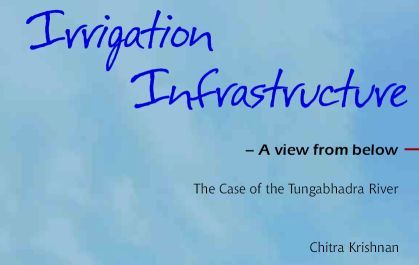Irrigation
Bookshelf: Water, Ecosystems & Society - A Confluence of Disciplines by Jayanta Bandyopadhay
Posted on 13 Mar, 2009 10:48 AM Author: Jayanta Bandyopadhay, Indian Institute of Management, Calcutta Published: April 2009 Pages : 212 Imprint : SAGE India Water, Ecosystems and Society is an excellent guide to interdisciplinary knowledge on water. It draws attention to ecological benefits of floods, economic productivity of water systems and the feasibility of the proposed river-link project of India. It focuses on the need to recognise ecosystem services provided by rivers as well as the necessity of environmental flows in such a system. The book deals with emerging areas of research, by connecting ecology, economics and water management. It will be a compelling read for academicians and students working in the fields of geography and environment science, development economics, environmental sociology, ecology, integrated water management and so on.
Author: Jayanta Bandyopadhay, Indian Institute of Management, Calcutta Published: April 2009 Pages : 212 Imprint : SAGE India Water, Ecosystems and Society is an excellent guide to interdisciplinary knowledge on water. It draws attention to ecological benefits of floods, economic productivity of water systems and the feasibility of the proposed river-link project of India. It focuses on the need to recognise ecosystem services provided by rivers as well as the necessity of environmental flows in such a system. The book deals with emerging areas of research, by connecting ecology, economics and water management. It will be a compelling read for academicians and students working in the fields of geography and environment science, development economics, environmental sociology, ecology, integrated water management and so on.
Overview of the 2008 Kosi flood situation from Samajik Shaikshanik Vikas Kendra
Posted on 02 Feb, 2009 09:01 PMThe following article is the latest update of an overview of Kosi floods by SSVK. It reveals the ineffective handling and inadequate supply of materials by the Government in the flood hit regions. It also points out the activities done by various organizations and SSVK itself.
"Irrigation infrastructure - A view from below"
Posted on 27 Dec, 2008 03:52 AM "Irrigation Infrastructure - A View from below" is a new research study by Chitra Krishnan funded by the "Knowledge in Civil Society" initiative.
"Irrigation Infrastructure - A View from below" is a new research study by Chitra Krishnan funded by the "Knowledge in Civil Society" initiative.
On the book shelf: Interlinking of Rivers in India, Issues and Concerns
Posted on 31 Aug, 2008 10:26 AM Key Features: Reviews the risks of inter-basin water transfers warns of critical disadvantages with India's proposed ILR plan offers viable less-risky solutions for water resource development. Inter-basin water transfers are complex human interventions on natural systems that can have profound adverse as well as beneficial social, economic and environmental implications. India's plan to interlink its rivers (ILR) and to transfer water may, according to one set of views, generate positive benefits through improved and expanded irrigation and may also contribute to flood and drought hazards mitigation for India, although the magnitudes are debatable. However, there are opposing views, in the context of India itself, that the interlinking plan is economically prohibitive, fraught with uncertainties, and has potential for disastrous and irreversible adverse after-effects. Water deficit can be reduced through improved water management without large scale engineering interventions. Moreover many of the rivers involved, particularly in the Himalayan component, are international and, therefore, the scheme has major implications for other riparians. Indeed, the planned transfer of water from the Ganges and Brahmaputra rivers will adversely impact Bangladesh socially, economically and environmentally---unless arrangements are made to maintain historical flows, which is unlikely to be feasible.
Key Features: Reviews the risks of inter-basin water transfers warns of critical disadvantages with India's proposed ILR plan offers viable less-risky solutions for water resource development. Inter-basin water transfers are complex human interventions on natural systems that can have profound adverse as well as beneficial social, economic and environmental implications. India's plan to interlink its rivers (ILR) and to transfer water may, according to one set of views, generate positive benefits through improved and expanded irrigation and may also contribute to flood and drought hazards mitigation for India, although the magnitudes are debatable. However, there are opposing views, in the context of India itself, that the interlinking plan is economically prohibitive, fraught with uncertainties, and has potential for disastrous and irreversible adverse after-effects. Water deficit can be reduced through improved water management without large scale engineering interventions. Moreover many of the rivers involved, particularly in the Himalayan component, are international and, therefore, the scheme has major implications for other riparians. Indeed, the planned transfer of water from the Ganges and Brahmaputra rivers will adversely impact Bangladesh socially, economically and environmentally---unless arrangements are made to maintain historical flows, which is unlikely to be feasible.
"Bittersweet waters: Irrigation practices and modern challenges in South India" - A DVD by French Institute of Pondicherry
Posted on 17 Jun, 2008 01:29 AMThe French Institute of Pondicherry has brought out a DVD titled "Bittersweet Waters: Irrigation Practices and Modern Challenges in South India". This trilingual documentary (French, English and Tamil ; 53 minutes) deals with the issues of water management in South India, a subject of underlying anxiety in towns as well as in the countryside.
Contents of the latest SANDRP newsletter : Solar power boom and many more stories
Posted on 03 Jan, 2008 01:01 AM The latest issue of SANDRP's newsletter contains the following: Solar Power Boom Bihar Floods 2007: Some lessons for everyone Power Options: New Look Required 11th Five Year Plan: Why it may not a
The latest issue of SANDRP's newsletter contains the following: Solar Power Boom Bihar Floods 2007: Some lessons for everyone Power Options: New Look Required 11th Five Year Plan: Why it may not a





